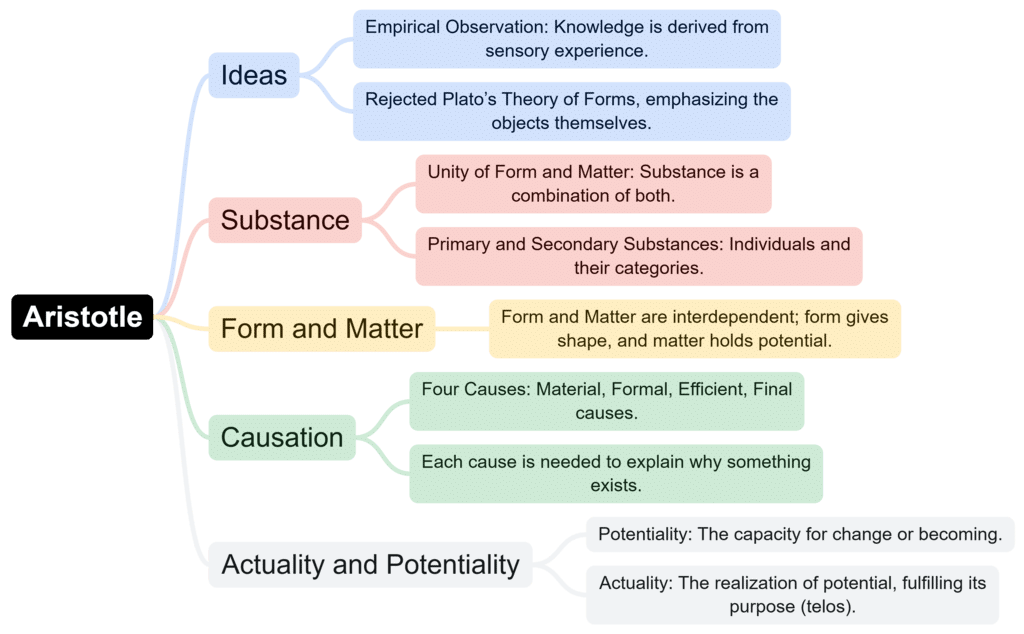Year 13 Exam > Year 13 Notes > Religion, Philosophy & Ethics for A Level > Mind Map: Plato and Aristotle
Mind Map: Plato and Aristotle | Religion, Philosophy & Ethics for A Level - Year 13 PDF Download


The document Mind Map: Plato and Aristotle | Religion, Philosophy & Ethics for A Level - Year 13 is a part of the Year 13 Course Religion, Philosophy & Ethics for A Level.
All you need of Year 13 at this link: Year 13
|
65 docs|15 tests
|
FAQs on Mind Map: Plato and Aristotle - Religion, Philosophy & Ethics for A Level - Year 13
| 1. What are the main differences between Plato and Aristotle's philosophies? |  |
Ans. The main differences between Plato and Aristotle's philosophies lie in their views on reality and knowledge. Plato believed in the Theory of Forms, asserting that non-material abstract forms represent the most accurate reality. In contrast, Aristotle rejected this idea and emphasized empirical observation and the study of the natural world, focusing on concrete entities rather than abstract forms. While Plato valued the world of ideas and thought, Aristotle prioritized practical knowledge and experience.
| 2. How did Plato influence Aristotle's thinking? |  |
Ans. Plato significantly influenced Aristotle's thinking, particularly through his emphasis on metaphysics and epistemology. Aristotle studied under Plato for about twenty years, during which he absorbed many of Plato's ideas, such as the importance of ethics and the pursuit of knowledge. However, Aristotle eventually diverged from Plato's theories, especially regarding the nature of reality and the method of acquiring knowledge, leading to the development of his own philosophical system.
| 3. What is the significance of Plato's Allegory of the Cave? |  |
Ans. Plato's Allegory of the Cave is significant because it illustrates his views on human perception and the nature of reality. In the allegory, prisoners in a cave perceive shadows as reality, symbolizing how most people live in ignorance. The journey of one prisoner who escapes the cave represents the philosopher's quest for knowledge and enlightenment, emphasizing the importance of education and the pursuit of truth beyond the superficial appearances of the world.
| 4. How do Plato and Aristotle view the role of the state and governance? |  |
Ans. Plato views the state as a means to achieve a just society led by philosopher-kings, who possess knowledge and wisdom. He believed that a well-ordered state is essential for individual virtue. Aristotle, on the other hand, emphasized the importance of practical governance and the role of citizens in a polity. He advocated for a mixed government that incorporates elements of democracy, oligarchy, and monarchy, arguing that the best state promotes the common good and allows for the flourishing of individuals.
| 5. What are the ethical theories proposed by Plato and Aristotle? |  |
Ans. Plato's ethical theory is rooted in the concept of the ideal Forms, particularly the Form of the Good, which guides moral behavior and is the ultimate goal of human life. In contrast, Aristotle proposed virtue ethics, emphasizing the importance of character and the cultivation of virtues through practice and habit. He believed that ethical living involves finding the mean between extremes (the Golden Mean) and acting in accordance with reason to achieve eudaimonia, or human flourishing.
Related Searches


















